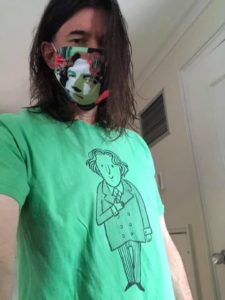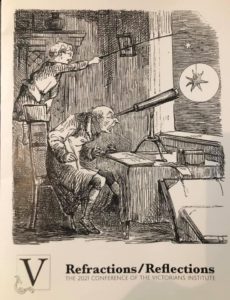
Professor of English Chris Foss, wearing an Oscar Wilde T-shirt.
On October 22, Professor of English Chris Foss presented a paper entitled “Reflection and Refraction in Oscar Wilde’s ‘The Selfish Giant’ and Clio Barnard’s The Selfish Giant” at the annual conference of the Victorians Institute in Charlotte, NC.
Foss first examined Wilde’s literary endorsement of fantasy over realism as a valuable entry point for considering Victorian reflections on disability and freakery, in particular where the nexus of poverty and disability-aligned difference is concerned. Seeing the Giant’s peculiar body as aligned with other nonnormative ones, especially freakish bodies, opens a new appreciation for how the story stands out relative to many other Victorian literary representations of disability.

Victorians Institute Program Cover
Wilde’s prison literature testifies to the extent to which Wilde’s own enfreakment and enfoolment in jail provided profound personal experiences of physical and psychological illness/disability that led him to refract but ultimately retain the tenor of his fairy tale. In the second half of the paper, Foss suggested how Barnard’s 2013 film both builds upon and departs from its Victorian predecessor’s approach. While employing a decidedly darker and unrelentingly realistic lens, Barnard’s film reinforces Wilde’s exposure of the ill treatment of and the damage done to disability-aligned bodies/minds, as well as his emphasis upon love and responsiveness in the face of suffering and loss.
Bringing together the reflection and refraction of Victorian ways of seeing disability-aligned difference through the pairing of these two texts compellingly supports the value of continuing the conversations around disability that Wilde’s Victorian fairy tales prompted over 125 years ago.